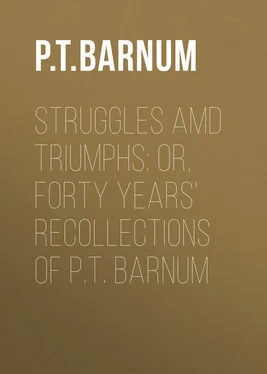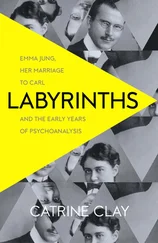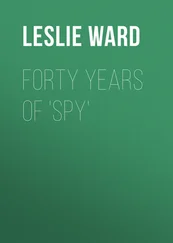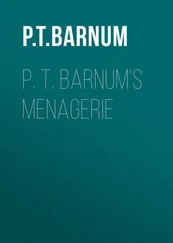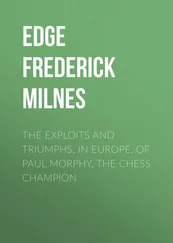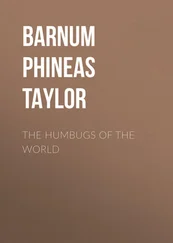Phineas Barnum - Struggles amd Triumphs - or, Forty Years' Recollections of P.T. Barnum
Здесь есть возможность читать онлайн «Phineas Barnum - Struggles amd Triumphs - or, Forty Years' Recollections of P.T. Barnum» — ознакомительный отрывок электронной книги совершенно бесплатно, а после прочтения отрывка купить полную версию. В некоторых случаях можно слушать аудио, скачать через торрент в формате fb2 и присутствует краткое содержание. Издательство: Иностранный паблик, Жанр: foreign_antique, foreign_prose, на английском языке. Описание произведения, (предисловие) а так же отзывы посетителей доступны на портале библиотеки ЛибКат.
- Название:Struggles amd Triumphs: or, Forty Years' Recollections of P.T. Barnum
- Автор:
- Издательство:Иностранный паблик
- Жанр:
- Год:неизвестен
- ISBN:нет данных
- Рейтинг книги:5 / 5. Голосов: 1
-
Избранное:Добавить в избранное
- Отзывы:
-
Ваша оценка:
- 100
- 1
- 2
- 3
- 4
- 5
Struggles amd Triumphs: or, Forty Years' Recollections of P.T. Barnum: краткое содержание, описание и аннотация
Предлагаем к чтению аннотацию, описание, краткое содержание или предисловие (зависит от того, что написал сам автор книги «Struggles amd Triumphs: or, Forty Years' Recollections of P.T. Barnum»). Если вы не нашли необходимую информацию о книге — напишите в комментариях, мы постараемся отыскать её.
Struggles amd Triumphs: or, Forty Years' Recollections of P.T. Barnum — читать онлайн ознакомительный отрывок
Ниже представлен текст книги, разбитый по страницам. Система сохранения места последней прочитанной страницы, позволяет с удобством читать онлайн бесплатно книгу «Struggles amd Triumphs: or, Forty Years' Recollections of P.T. Barnum», без необходимости каждый раз заново искать на чём Вы остановились. Поставьте закладку, и сможете в любой момент перейти на страницу, на которой закончили чтение.
Интервал:
Закладка:
My first impressions of this girl as I saw her at the house were exceedingly favorable. As soon as we started I began a conversation with her and finding her very affable I regretted that the distance to Bethel was not five miles instead of one. A flash of lightning gave me a distinct view of the face of my fair companion and then I wished the distance was twenty miles. During our ride I learned that she was a tailoress, working with Mr. Zerah Benedict, of Bethel. We soon arrived at our destination and I bid her good night and went home. The next day I saw her at church, and, indeed, many Sundays afterwards, but I had no opportunity to renew the acquaintance that season.
Mrs. Jerusha Wheeler, with whom I boarded, and her daughter Jerusha were familiarly known, the one as “Aunt Rushia,” and the other as “Rushia.” Many of our store customers were hatters, and among the many kinds of furs we sold for the nap of hats was one known to the trade as “Russia.” One day a hatter, Walter Dibble, called to buy some furs. I sold him several kinds, including “beaver” and “cony,” and he then asked for some “Russia.” We had none, and, as I wanted to play a joke upon him, I told him that Mrs. Wheeler had several hundred pounds of “Russia.”
“What on earth is a woman doing with ‘Russia?’ ” said he.
I could not answer, but I assured him that there were one hundred and thirty pounds of old Rushia and one hundred and fifty pounds of young Rushia in Mrs. Wheeler’s house, and under her charge, but whether or not it was for sale I could not say. Off he started to make the purchase and knocked at the door. Mrs. Wheeler, the elder, made her appearance.
“I want to get your Russia,” said the hatter.
Mrs. Wheeler asked him to walk in and be seated. She, of course, supposed that he had come for her daughter “Rushia.”
“What do you want of Rushia?” asked the old lady.
“To make hats,” was the reply.
“To trim hats, I suppose you mean?” responded Mrs. Wheeler.
“No, for the outside of hats,” replied the hatter.
“Well, I don’t know much about hats,” said the old lady, “but I will call my daughter.”
Passing into another room where “Rushia” the younger was at work, she informed her that a man wanted her to make hats.
“Oh, he means sister Mary; probably. I suppose he wants some ladies’ hats,” replied Rushia, as she went into the parlor.
“This is my daughter,” said the old lady.
“I want to get your Russia,” said he, addressing the young lady.
“I suppose you wish to see my sister Mary; she is our milliner,” said young Rushia.
“I wish to see whoever owns the property,” said the hatter.
Sister Mary was sent for, and as she was introduced, the hatter informed her that he wished to buy her “Russia.”
“Buy Rushia!” exclaimed Mary in surprise; “I don’t understand you.”
“Your name is Miss Wheeler, I believe,” said the hatter, who was annoyed by the difficulty he met with in being understood.
“It is, sir.”
“Ah! very well. Is there old and young Russia in the house?”
“I believe there is,” said Mary, surprised at the familiar manner in which he spoke of her mother and sister, who were present.
“What is the price of old Russia per pound?” asked the hatter.
“I believe, sir, that old Rushia is not for sale,” replied Mary indignantly.
“Well, what do you ask for young Russia?” pursued the hatter.
“Sir,” said Miss Rushia the younger, springing to her feet, “do you come here to insult defenceless females? If you do, sir, we will soon call our brother, who is in the garden, and he will punish you as you deserve.”
“Ladies!” exclaimed the hatter, in astonishment, “what on earth have I done to offend you? I came here on a business matter. I want to buy some Russia. I was told you had old and young Russia in the house. Indeed, this young lady just stated such to be the fact, but she says the old Russia is not for sale. Now, if I can buy the young Russia I want to do so – but if that can’t be done, please to say so and I will trouble you no further.”
“Mother, open the door and let this man go out; he is undoubtedly crazy,” said Miss Mary.
“By thunder! I believe I shall be if I remain here long,” exclaimed the hatter, considerably excited. “I wonder if folks never do business in these parts, that you think a man is crazy if he attempts such a thing?”
“Business! poor man!” said Mary soothingly, approaching the door.
“I am not a poor man, madam,” replied the hatter. “My name is Walter Dibble; I carry on hatting extensively in Danbury; I came to Grassy Plains to buy fur, and have purchased some ‘beaver’ and ‘cony,’ and now it seems I am to be called ‘crazy’ and a ‘poor man,’ because I want to buy a little ‘Russia’ to make up my assortment.”
The ladies began to open their eyes; they saw that Mr. Dibble was quite in earnest, and his explanation threw considerable light upon the subject.
“Who sent you here?” asked sister Mary.
“The clerk at the opposite store,” was the reply.
“He is a wicked young fellow for making all this trouble,” said the old lady; “he has been doing this for a joke.”
“A joke!” exclaimed Dibble, in surprise. “Have you no Russia, then?”
“My name is Jerusha, and so is my daughter’s,” said Mrs. Wheeler, “and that, I suppose, is what he meant by telling you about old and young Rushia.”
Mr. Dibble bolted through the door without another word and made directly for our store. “You young scamp!” said he as he entered; “what did you mean by sending me over there to buy Russia?”
“I did not send you to buy Rushia; I supposed you were either a bachelor or widower and wanted to marry Rushia,” I replied, with a serious countenance.
“You lie, you young dog, and you know it; but never mind, I’ll pay you off some day”; and taking his furs, he departed with less ill-humor than could have been expected under the circumstances.
Among our customers were three or four old Revolutionary pensioners, who traded out the amounts of their pensions before they were due, leaving their papers as security. One of these pensioners was old Bevans, commonly known as “Uncle Bibbins,” a man who loved his glass and was very prone to relate romantic Revolutionary anecdotes and adventures, in which he, of course, was conspicuous. At one time he was in our debt, and though we held his pension papers, it would be three months before the money could be drawn. It was desirable to get him away for that length of time, and we hinted to him that it would be pleasant to make a visit to Guilford, where he had relations, but he would not go. Finally, I hit upon a plan which “moved” him.
A journeyman hatter, named Benton, who was fond of a practical joke, was let into the secret, and was persuaded to call “Uncle Bibbins” a coward, to tell him that he had been wounded in the back, and thus to provoke a duel, which he did, and at my suggestion “Uncle Bibbins” challenged Benton to fight him with musket and ball at a distance of twenty yards. The challenge was accepted, I was chosen second by “Uncle Bibbins,” and the duel was to come off immediately. My principal, taking me aside, begged me to put nothing in the guns but blank cartridges. I assured him it should be so, and therefore that he might feel perfectly safe. This gave the old man extra courage; he declared that he had not been so long in bloody battles “for nothing,” and that he would put a bullet through Benton’s heart at the first shot.
The ground was measured in the lot at the rear of our store, and the principals and seconds took their places. At the word given both parties fired. “Uncle Bibbins,” of course, escaped unhurt, but Benton leaped several feet into the air, and fell upon the ground with a dreadful yell, as if he had been really shot. “Uncle Bibbins” was frightened. As his second, I ran to him, told him I had neglected to extract the bullet from his gun (which was literally true, as there was no bullet in it to extract), and he supposed, of course, he had killed his adversary. I then whispered to him to go immediately to Guilford, to keep quiet, and he should hear from me as soon as it would be safe to do so. He started up the street on a run, and immediately quit the town for Guilford, where he kept himself quiet until it was time for him to return and sign his papers. I then wrote him that “he could return in safety; that his adversary had recovered from his wound, and now forgave him all, as he felt himself much to blame for having insulted a man of his known courage.”
Читать дальшеИнтервал:
Закладка:
Похожие книги на «Struggles amd Triumphs: or, Forty Years' Recollections of P.T. Barnum»
Представляем Вашему вниманию похожие книги на «Struggles amd Triumphs: or, Forty Years' Recollections of P.T. Barnum» списком для выбора. Мы отобрали схожую по названию и смыслу литературу в надежде предоставить читателям больше вариантов отыскать новые, интересные, ещё непрочитанные произведения.
Обсуждение, отзывы о книге «Struggles amd Triumphs: or, Forty Years' Recollections of P.T. Barnum» и просто собственные мнения читателей. Оставьте ваши комментарии, напишите, что Вы думаете о произведении, его смысле или главных героях. Укажите что конкретно понравилось, а что нет, и почему Вы так считаете.
